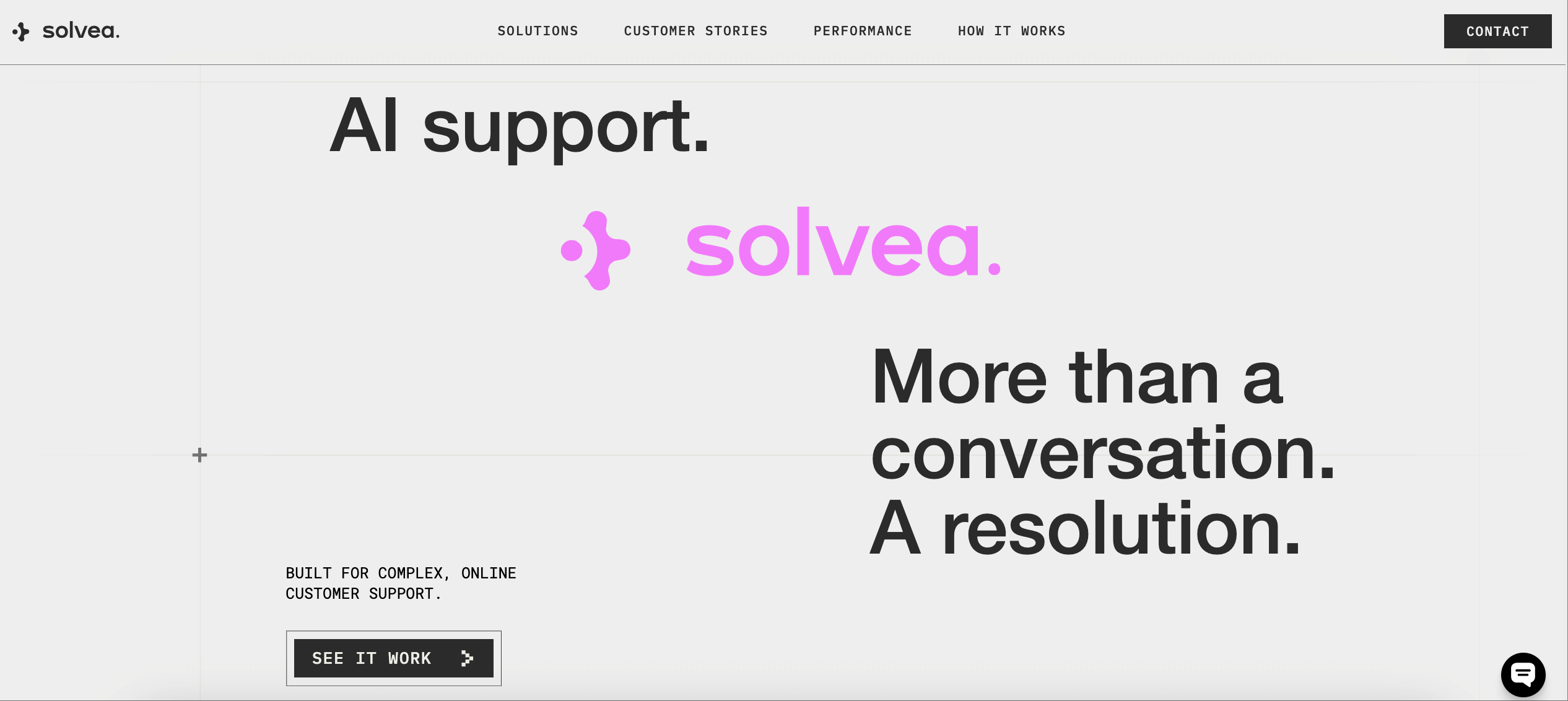This post summarizes the top 10 AI customer experience examples in the real world and introduces several best AI customer service solutions for you.
Artificial Intelligence (AI) has revolutionized customer service solutions around the world. Countless AI customer experience examples have emerged in all walks of life, such as AI chatbots for travel and hospitals, AI agents for E-commerce, and AI self-service for healthcare.
AI customer service has developed rapidly since the pandemic. According to the report from Grand View Research, the global market size of AI customer service was valued $13.0124 billion in 2024 and is expected to reach $83.8549 billion by 2033, with an annual growth rate of 23.2%.
AI is improving customer service experience in all sorts of ways you might not expect. Want to know more examples of AI in customer service? Let’s get started!
Top 10 AI Customer Experience Examples
With the arrival of the era of AI, the traditional customer service industry is undergoing enormous changes, and a variety of AI customer service companies are also coming into being.
To give you a deep understanding of how AI improves customer experience, here are the top 10 AI customer experience examples in the real world.
1.AI-powered Chatbots
AI-powered chatbots are now widely used in the customer service of many industries, such as E-commerce, travel, and hospitals. There are various reasons for using AI chatbots in customer service, and the top one is to automatically handle customer inquiries at any time and from anywhere.
With AI chatbots, the customer service team can free up from most repetitive and redundant tasks, focusing on resolving more complex issues. They help support teams save time and costs by automating the routine inquiries about order status, product information, historical data, personal accounts, and much more.
For example, the global retail giant H&M utilizes generative AI chatbots to assist shoppers in finding their favorite clothes and accessories more easily. The response time of chatbots is up to 70% faster than that of human customer service, significantly improving the overall customer experience.
2.Conversational AI
Conversational AI is also a common example of AI in customer service. It can use many technologies, like Natural Language Processing (NLP) and machine learning, to understand and respond to human language. It can interact with customers in a better and more accurate way.
The implementation of conversation AI solutions can be commonly seen in the healthcare industry since the COVID-19 era. For instance, they are deployed to manage patient inquiries, help patients schedule appointments, and offer guidance on healthcare services via simple voice commands.
3.AI Agent Assist
In today’s customer service, AI agents greatly enhance the capabilities of the human service team by offering real-time assistance during interactions. They act as a human support system that can quickly calm customers' emotions when they are urgent or give them appropriate advice when they are confused.
AI agents greatly improve customer service efficiency while reducing operational costs. Here’s a true example of AI in customer service:
Oceania is a global e-commerce and export trading group. However, in recent years, customer support has been limited by staffing constraints and growing training costs. Solvea AI agents helped Oceania automatically classify incoming tickets, achieving a 5× increase in ticket-handling efficiency, reducing human agent workload and costs.
4.Sentiment Insights
As AI technologies develop, AI customer service support is becoming smarter with sentiment analysis. It enables the service team to identify the emotions of the customers during communication, such as anger, happiness, or anxiety, and give an appropriate response to their inquiries.
For example, if a customer has experienced a long wait time in the recent inquiry and still has an unresolved billing issue, sentiment analysis can capture the frustration and predict a high chance of the customer leaving, which lets your agent solve the problem quickly and keep the customer satisfied.
5.Machine Learning
Machine learning plays an important role in AI customer experience, which can gain insights into what truly matters to each customer. It enables the AI gents to learn and improve from previous experiences so that customers can enjoy personalized service.
A practical example of this can be seen in the e-commerce industry. Online retailers use machine learning technology to process customer feedback and reviews, which helps them find common issues for follow-up, such as adjusting product descriptions, offerings, or upgrades.
6.AI-powered Self-service
The development of AI technology breaks through the time and space restrictions of traditional customer service. Nowadays, AI customer service solutions offer 24/7 self-service support where customers can get instant responses and resolve issues by themselves.
For example, Amazon also builds personalized and intuitive self-service webpages so that each customer can find desired product information quickly. Besides, the self-service troubleshooting tutorial makes it easy for customers to get appropriate resolutions without human intervention.
7.Natural Language Processing
Natural Language Processing (NLP) is another common example of AI technology in customer experience. It enables your AI chatbots or agents to understand and respond to customer inquiries in a way that feels natural. In the world of customer service, especially in call centers, NLP plays a key role in improving customer experience and maintaining service quality.
For instance, AI assistants, like Amazon’s Alexa or Apple’s Siri, can understand what we say and respond with relevant answers based on the NPL technology. They make certain business activities easier, like ordering items and cancelling orders, and sometimes even answering questions in a humorous way that feels like a human.
8.Automate Ticket Creation
In terms of customer service, AI can even help customers automate ticket creation by guiding them to submit their questions through a chatbot widget. This widget can avoid duplicate support tickets and create tickets for inquiries that can’t be responded to automatically. For both customers and service staff, AI makes the ticket creation process simpler, significantly saving time.
Automated ticket creation is commonly seen in ticketing platforms, like Eventcube, TicketTailor, and Ticketmaster. It allows customers to generate tickets by themselves based on the predefined triggers, schedules, and rules of these platforms. This process removes the need for manual ticket creation and ensures consistent service.
9.AI Product Recommendations
AI product recommendations can utilize machine learning algorithms to analyze customer data, such as browsing history, past purchases, and demographics. By doing so, customers will be offered personalized products, services, or content. This AI-powered suggestion can maintain customer stickiness and increase sales by showing their interested products.
These examples of AI algorithm recommendations are everywhere in reality, such as Amazon’s suggested products based on browsing and purchase history, TikTok’s “For You” pages, and Boohoo’s "We think you'll love" content.
10.AI Predictive Customer Analytics
AI technologies can give predictive insights into customer needs and behaviors based on their historical and real-time data. With these advanced analytics tools, businesses can predict future customer interactions and offer personalized solutions. It is vitally important for improving customer retention and optimizing marketing strategies.
For example, a financial service company uses AI predictive customer tools to analyze account balances, login frequencies, and spending behaviors to offer customized service. Such targeted methods improve the overall customer experience by tailoring services to individual needs.
Best AI Customer Service Companies in 2025
Are you still looking for an AI customer service solution for your business? Here are the top 5 AI customer service companies in 2025. Let’s have a quick overview of their features, affordability, and best for.
Note: The price may fluctuate over time or with subscription methods. So, please visit the official websites of these platforms.
Software | Best for | Key Features | Starting price |
Solvea | Multilingual customer service automation at scale | lMultilingual support lHuman-level accurate resolutions lRouting ticket to the right team lSelf-learning | Outcome-based pricing model |
Tidio | Small businesses needing affordable AI support | lPowered by GPT-4 lLive chat lMulti-channel support lThird-party integrations | $24.17/agent/month |
Zendesk | Pre-trained AI support across all channels | lAI agents lAI-powered knowledge base lTicket response suggestions | $19/agent/month |
HubSpot | CRM-integrated customer support | lChatbot integrated with CRM lMulti-channel support lEmail Marketing lTask management | $9/agent/month |
Intercom | AI chat combined with human support | lLive chat lMessaging lAI chatbot lSelf-service | $50/agent/month |
1.Solvea
Solvea is an all-in-one AI customer service solution that provides instant and 24/7 customer support in many languages. It works like a real person with human-level accuracy and empathy. It enables you to easily connect with existing tools, like Shopify, Zendesk, and Intercom, with one click.
Since its release, Solvea has helped lots of businesses improve their customer experiences. For example, the AI-powered analysis of Solvea helped Anker enhance customer satisfaction by 30% through personalized support. Oceania boosts efficiency 5X and saves 2.37h/day with Solvea, while solving multilingual support and improving overall CX.

Pros:
- Multiple language coverage
- Responds in seconds
- Easy to deploy with existing tools
- 1,000+ concurrent conversations
Cons:
- No voice support
2.Tidio
Tidio is suited for small businesses needing affordable AI customer service support. It combines live chat and AI chatbot tools to automate customer inquiries and manage multichannel conversations. With the AI assistant, Lyro, powered by GPT-4, Tidio can easily handle most inquiries by itself or provide human-like responses from the existing help docs.

Pros:
- User-friendly navigation dashboard
- Customizable widget and chat branding chatbots
- Integrate with live chat
- Smart AI-human interaction
Cons:
- Voice messages aren’t supported in chat
3.Zendesk
Zendesk is a comprehensive AI customer service solution, especially useful for those looking to optimize omnichannel support processes. With strong AI technologies, Zendesk agents were trained on the world’s largest CX dataset, including trillions of data points from real service interactions. It can work immediately with your current systems and save you a significant amount of time on configuration.

Pros:
- Omnichannel support
- Robust AI-powered knowledge base
- Integrations with third-party apps and systems
- Advanced insights and reporting tools
Cons:
- High costs for advanced features
- Minor lags in ticket sync
4.HubSpot
HubSpot’s customer service AI chatbot is ideal for those who need CRM-powered customer support automation. It helps your business qualify leads, answer common questions, and route requests using real-time CRM data. It also allows customers to chat across WhatsApp, website widgets, Facebook Messenger, and SMS.

Pros:
- Real-time CRM sync
- Easy connection between live agents and chatbots
- Strong integrations with third-party apps
Cons:
- Complex pricing
5.Intercom
Intercom offers an AI chatbot named Fin, best for combining AI chat with human support in one platform. It stands out because it combines human support and automation perfectly. With its core AI chatbot powered by GPT-4, Fin can pull real-time answers from your help docs, FAQs, even public URLs or PDFs.

Pros:
- Real-time and personalized interaction
- Supports 45+ languages
- Offers detailed customer tracking and segmentation
Cons:
- High pricing for a larger support team
Wrapping Things Up
This post explores the top 10 Gen AI and customer experience examples in the real world. If you are trying to find the best AI customer support for your business, you can pick one from the above recommendations. Additionally, we’d appreciate it if you could share this blog post on your social media or communities.
AI Customer Experience Examples FAQ
1.How is AI used in customer experience?
AI technologies significantly enhance customer experience by analyzing and sorting through a large amount of real customer interactions. This analysis can boost the support team to provide personalized service and address customer needs even without human intervention.
2.How is Netflix using AI to enhance customer experience?
To enhance customer experience, Netflix uses two AI recommendation methods: Collaborative Filtering and Content-Based Filtering. The former analyzes user behaviors to recommend content based on shared preferences among similar users, and the latter recommends shows or movies using metadata like genres, cast, and themes.
3.How can AI be used with CRM to improve customer experience?
With a CRM system integrated, AI can improve CX by offering personalized service, predictive analytics for sales, automated customer inquiries, and robust data management. Besides, predictive AI can be used for churn forecasting to identify unsatisfied customers and personalize retention strategies.
4.How is AI personalizing the customer experience?
Based on browsing and purchasing history, AI can personalize the customer experience by offering customized product recommendations. For example, online software vendors use AI analytics to predict user needs and promote their products through personalized emails.









